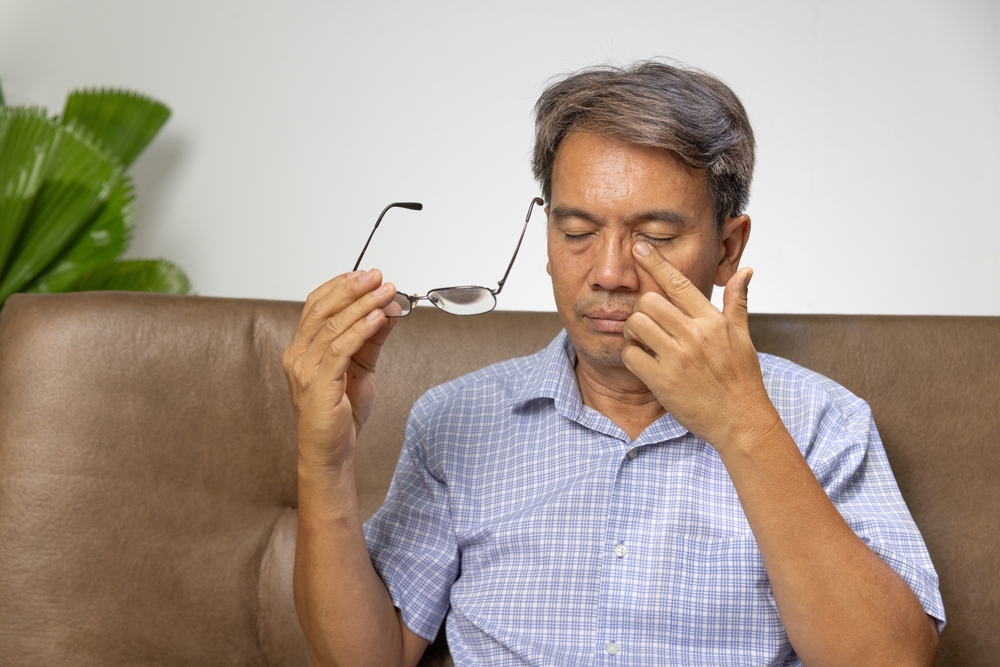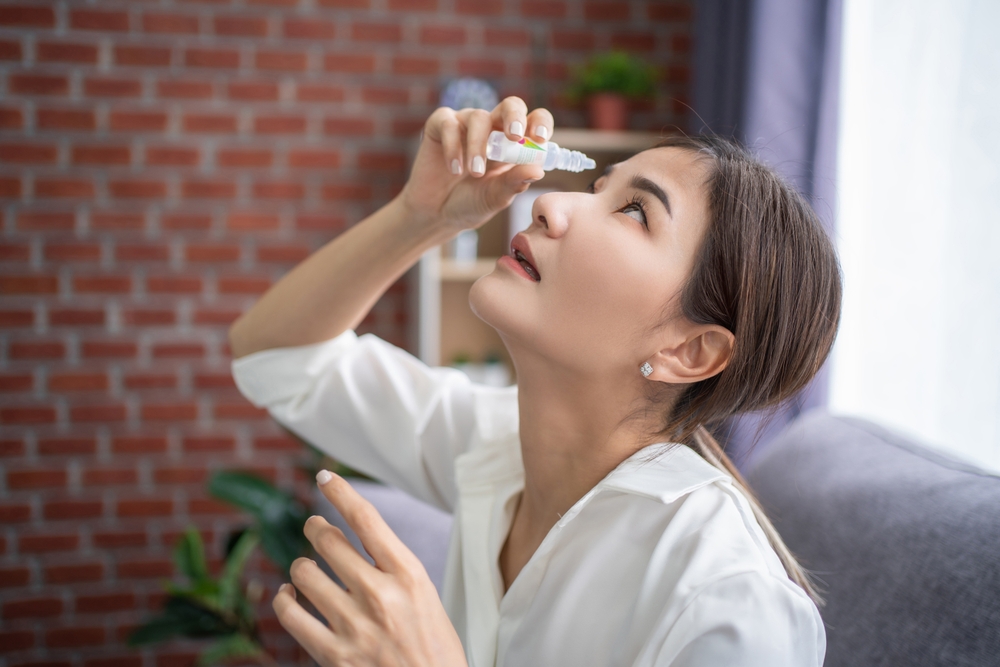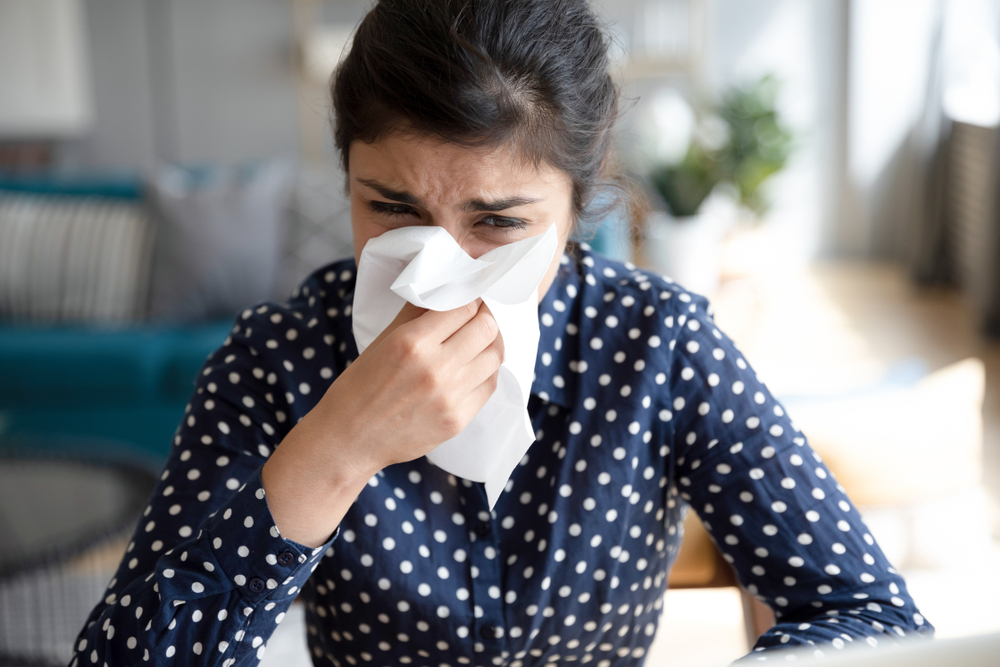Are your eyes dry, itchy, or red? Both dry eyes and allergies share several symptoms and can occur together.
Moreover, allergies can sometimes cause or worsen dry eye symptoms and vice versa. So, it can be hard to know whether you have allergies, dry eyes, or both.
Fortunately, there are ways to tell the two apart so you can get some much-needed relief. Keep reading to learn more about dry eyes, allergies, the connection between the two, and how to distinguish them!
What is Dry Eye?
Dry eye is a common condition that occurs when the eyes produce poor-quality tears or don’t produce enough tears. Tears are made of three layers: the oily layer, the watery layer, and the mucus layer.

Each of these layers is essential for producing high-quality tears. The oily layer prevents your tears from drying up too fast.
The watery layer keeps your eyes moisturized, while the mucus layer helps your tears stick to the surface of your eyes. Together, these layers ensure your eyes remain healthy and comfortable.
A problem with any of these layers can lead to dry eyes. There are many reasons why you may have dry eyes.
Some of the common causes of dry eye include:
- Allergies
- Pregnancy or menopause
- Blepharitis or eyelid infection
- Meibomian gland dysfunction
- Being in a dry, smoky, or windy environment
- Age
- Certain health conditions such as rheumatoid arthritis, thyroid disease, or lupus
- Medications like decongestants, antihistamines, antidepressants, antacids, beta-blockers, or anxiety medications
What Are the Symptoms of Dry Eye?
Dry eyes can cause many irritating symptoms. Common symptoms may include:
- Dryness
- Red eyes
- Eye fatigue
- Light sensitivity
- Blurred or double vision
- Burning or stinging sensation
- Trouble wearing contact lenses
- The feeling of a foreign body in the eye
- Stringy mucus around or in the eyes
Another interesting symptom of dry eye is increased tearing. This occurs because the dryness and irritation stimulate the lacrimal glands to produce a flood of tears to lubricate the eyes.
However, these reflex tears are mostly made up of water and don’t have the right balance of ingredients found in normal, lubricating tears. As a result, they don’t effectively soothe dry, irritated eyes and provide only temporary relief.
What Are Eye Allergies?

An eye allergy, or allergic conjunctivitis, is the inflammation of the conjunctiva caused by an allergic reaction to substances called allergens. The conjunctiva is the thin transparent mucous membrane that covers the sclera, which is the white of the eye, and the inside of the eyelids.
Its job is to keep your eyes lubricated and protect them from foreign objects. The conjunctiva is prone to irritation from allergens like pollen and smoke.
An allergen is usually a harmless substance that your body considers dangerous. Common indoor and outdoor allergens include:
- Dust
- Mold
- Perfume
- Pet dander
- Some cosmetics
- Certain eye drops
- Pollen from ragweed, grass, and trees
Allergens cause an overreaction in your immune system. This is what is known as an allergic reaction.
When an allergen gets into your eyes, your immune system overreacts and sets off defenses by releasing chemicals, including histamine, to fight the perceived invader. Histamine can cause eye irritation and inflammation, leading to itchiness, dryness, redness, and other allergy symptoms.
Eye allergies can be either perennial (year-round) or seasonal, meaning they only happen during certain seasons.
What Are The Symptoms of Eye Allergies?
With allergies, signs can be similar to dry eyes, but the hallmark symptom is itchiness. Other signs of eye allergies include:
- Redness
- Dry eyes
- Watery eyes
- Swollen eyelids
- Under eye circles
- Sensitivity to light
- Burning or irritation
Symptoms of eye allergies may happen alone or be accompanied by a stuffy or runny nose, sneezing, or coughing.
The Connection between Allergies and Dry Eyes
Allergies and dry eyes can go hand in hand, and one can cause or exacerbate the other. Dry eye symptoms can worsen when you’re exposed to allergens such as pollen, dust, pet dander, wind, and dry air.
Beyond irritating your eyes more, these allergens may also trigger dry eyes. Allergies can cause inflammation of the meibomian glands.

Meibomian glands are the tiny glands that line the inside of your lower and upper eyelids. These glands produce the oily layer that prevents your tears from evaporating rapidly.
If these glands become inflamed due to allergies, you may develop meibomian gland dysfunction, resulting in dry eyes. Inflammation can block your meibomian glands, which reduces the quality of your tear film, leading to increased evaporation of tears.
When tears evaporate too fast, your eyes can become irritated and dry.
Allergies can be treated with antihistamines.
However, antihistamines may decrease tear production, causing dry eyes or aggravating your dry eye symptoms. In some cases, a person can suffer from dry eyes and allergies at the same time.
The Difference Between Dry Eyes and Allergies
Although dry eyes and allergies share similar symptoms, they’re entirely different. The most notable difference between dry eyes and allergies is the itching.
Itching is more intense with allergies. The itching is often accompanied by nasal allergies, which include frequent sneezing along with a stuffy or runny nose.
While dry eyes might result in some itching, it’s not as intense. Dry eyes tend to cause more irritation and burning or stinging.

Additionally, you may feel as though you have something in your eye with dry eyes. The triggers and frequency of symptoms can also determine whether you have allergic conjunctivitis.
You likely have allergies if your symptoms occur after exposure to a certain allergen or during certain times of the year. Another way to distinguish allergies from dry eyes is puffiness.
Unlike dry eyes, allergies cause puffiness or swelling. Because many symptoms of dry eyes and allergies overlap, it’s important to visit your eye doctor at Cheema MD for a correct diagnosis.
An ophthalmologist can perform specific eye exams and eye tests to determine whether you have allergies or dry eyes and provide a comprehensive individualized treatment plan.
Get Relief from Dry Eyes and Allergies
You don’t have to live with the discomfort and irritation of dry eyes or allergies. You can find long-lasting relief by visiting Cheema MD Eye Care.
Dr. Cheema will accurately determine the root cause of your symptoms and provide the most effective treatment tailored to your unique needs.
Do you think you have dry eyes or allergies? Schedule an appointment at Cheema MD Eye Care in Kingston, NY, today to get to the bottom of your symptoms and restore your eye health.



